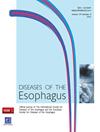465. COMPLETE RESPONSE IN BARRETT’S HIGH-GRADE DYSPLASIA WITH THE UTILISATION OF RADIOFREQUENCY ABLATION: A SYSTEMATIC REVIEW
IF 2.3
3区 医学
Q3 GASTROENTEROLOGY & HEPATOLOGY
引用次数: 0
Abstract
Radiofrequency ablation (RFA) is increasingly utilised as part of the endoscopic treatment of Barrett’s esophagus (BE) with high-grade dysplasia as a recognised alternative to surgical resection. The aim of this review is to summarise the current evidence on the utility of RFA in achieving complete clearance of HGD within BE and any resultant treatment complications with this endoscopic therapeutic option. A search of the major reference databases (PubMed, Medline, Cochrane) was performed with no time limits up to December 2022. Results were screened in line with the Preferred Reporting Items for Systematic Reviews and Meta-Analyses (PRISMA) guidelines. Studies were included if the patient cohort included patients with HGD undergoing RFA, regardless of whether other endoscopic and/or surgical techniques were subsequently utilised and analysed. Fourteen studies comprising 1411 patients were included. Among this cohort, 850 patients with HGD underwent at least one session of RFA. Complete eradication of HGD was noted in 800/850 (94.1%) of patients. The pooled estimates of complete eradication of HGD and intestinal metaplasia (IM) were 92.5% (95% CI 87.6%–96.2%) and 81.8% (95% CI 74.9%–87.9%), respectively. The incidence of adverse events related to RFA was low, with esophageal stricture being the most common (10.6%). Long-term follow-up reported in the included studies showed sustained eradication of HGD with recurrence noted in 22 (2.6%) of patients. RFA is a safe and effective treatment option for patients with HGD within BE. However, data from larger patient cohorts, ideally within a trial setting, are needed, to establish the long-term treatment efficacy and identify cohorts that may not benefit from this procedure or require multiple treatments.射频消融治疗BARRETT高度发育不良的完全缓解:一项系统综述
射频消融术(RFA)越来越多地被用作Barrett食管(BE)的内窥镜治疗的一部分,作为外科切除术的公认替代方案。本综述的目的是总结目前关于RFA在BE内实现HGD完全清除以及由此产生的任何内镜治疗并发症方面的实用性的证据。截至2022年12月,对主要参考数据库(PubMed、Medline、Cochrane)进行了无时间限制的搜索。根据系统评价和荟萃分析首选报告项目(PRISMA)指南对结果进行筛选。如果患者队列包括接受RFA的HGD患者,则包括研究,无论随后是否使用和分析了其他内窥镜和/或手术技术。14项研究包括1411名患者。在这一队列中,850名HGD患者至少接受了一次RFA治疗。在800/850例(94.1%)患者中发现HGD完全根除。完全根除HGD和肠化生(IM)的合并估计值分别为92.5%(95%CI 87.6%–96.2%)和81.8%(95%CI 74.9%–87.9%)。与RFA相关的不良事件发生率较低,其中食管狭窄最为常见(10.6%)。纳入研究中报告的长期随访显示,22名(2.6%)患者的HGD持续根除并复发。RFA是BE内HGD患者的一种安全有效的治疗选择。然而,需要来自更大患者队列的数据,最好是在试验环境中,以确定长期治疗效果,并确定可能无法从该程序中受益或需要多种治疗的队列。
本文章由计算机程序翻译,如有差异,请以英文原文为准。
求助全文
约1分钟内获得全文
求助全文
来源期刊

Diseases of the Esophagus
医学-胃肠肝病学
CiteScore
5.30
自引率
7.70%
发文量
568
审稿时长
6 months
期刊介绍:
Diseases of the Esophagus covers all aspects of the esophagus - etiology, investigation and diagnosis, and both medical and surgical treatment.
 求助内容:
求助内容: 应助结果提醒方式:
应助结果提醒方式:


